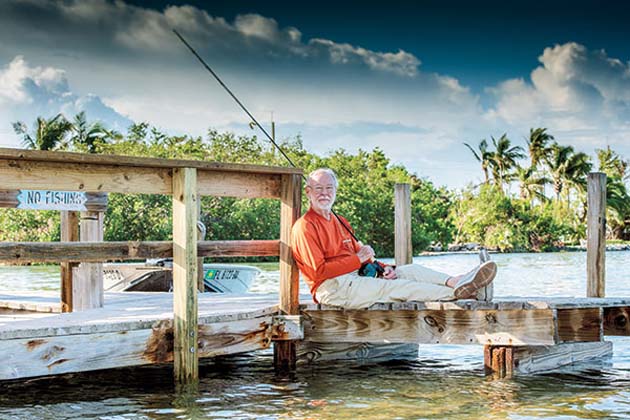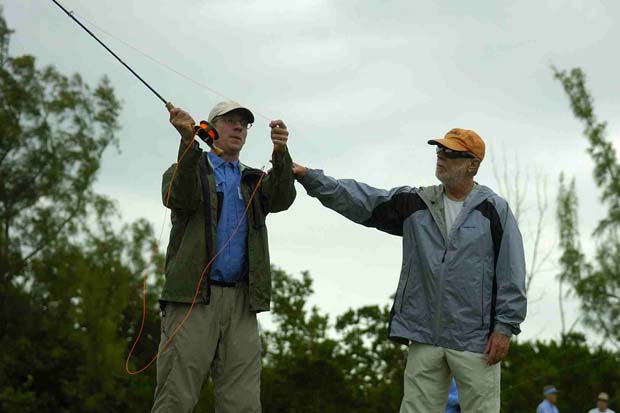
Sandy Moret was nominated for the 2018 Fly Fisherman Conservationist of the Year Award by Harold Brewer, chairman of the board of Bonefish & Tarpon Trust (BTT). Sage will donate $5,000 to BTT in Moret’s name to support the efforts of the Now or Neverglades coalition to restore healthy flows to the Everglades. Moret will receive the award at BTT’s annual Islamorada Dinner, Jan. 19, 2018 at the Islander Resort. To sign the declaration, visit Glades Declaration. Our goal is to reach 100,000 signatures in 2018. Greg Poland photo.
Bonefish & Tarpon Trust founding member Sandy Moret wins 2018 Fly Fisherman Conservationist of the Year Award
by Sarah Grigg / Fly Fisherman Magazine / December 27, 2017
NOTE: This story is abridged – to read the complete story scroll down to the link.
[dropcap]A[/dropcap]merica’s sugar lobby is one of the fiercest and most powerful on Capitol Hill. Everglades National Park is one of America’s greatest treasures. Our heavily subsidized sugar industry—a program that costs taxpayers roughly $3.5 billion annually—offers nothing sweet to consumers, taxpayers, or Florida’s waterways. The Florida Everglades represent perhaps one of the greatest casualties of a small, yet powerful special interest group.
For nearly 40 years, Sandy Moret, recipient of the 2018 Fly Fisherman Conservationist of the Year Award, has fought Florida’s water management policies, which historically focused on satisfying the demands of the sugar cane industry to the detriment of the Everglades. . . .
. . . “Over the years, I saw the shortcomings of Florida water management and what was happening to the Everglades,” Moret said. “To understand the problem, you have to really understand how the Everglades work.”
At one time, the Everglades stretched from present-day Orlando to the Florida Keys, with the entire watershed flowing from north to south. Water from the Kissimmee River moved southward to Lake Okeechobee. Some water also flowed east and west through the Saint Lucie and Caloosahatchee rivers. During the rainy season, Okeechobee overflowed, replenishing the Everglades and forming a slow-moving grass river flowing to Florida Bay. During dry seasons, the flow dropped and the Everglades dried seasonally, a unique and critical ecosystem feature. The ebb and flow of water followed natural precipitation cycles.
Everglades National Park provides critical habitat for rare and endangered species like manatees, American crocodiles, and Florida panthers. The 1.5 million acres of wetland is designated a World Heritage Site, International Biosphere Reserve, and a Wetland of International Importance. Annually, the park attracts 1.1 million visitors generating $104.5 million revenue for the state. A 2009 report by Bonefish & Tarpon Trust estimated the total annual economic output of the Everglades recreational freshwater fishery to be $352.5 million and saltwater, $883.6 million. . . .

Sandy Moret teaching a student the art of a relaxed cast. Moret’s Florida Keys Fly Fishing School is the standard by which all saltwater fly fishing schools are measured. The famous school has been written up in the Wall Street Journal, Forbes, New York Times and every fly fishing magazine ever printed. Glenn Pittard photo.
Sugar, politics and favors
. . . Today, the sugar industry – controlled and owned mostly by two powerful families – grips many Florida Congress members by the neck, and according to bullsugar.org, “Big Sugar is left with upwards of $65 million in direct, artificial windfall profits to be spent annually on buying politicians, lobbyists, and major influence within the media.”
These companies block solutions to South Florida’s water woes outlined in Amendment 1. They artificially inflate the price of land around Lake Okeechobee essential to restoring the Everglades, making it impossible to purchase critical habitat.
“I’m not a political guy, but this is political,” said Moret. “Our campaign contribution system is behind this environmental problem. In Florida, we manage water like they do in Bangladesh.” . . .
. . . “You have to do something,” said Moret. “I’m 71 years old. I’ll never see the water flow in my lifetime. But my kids and my grandkids should have it. It’s not right to take it away from them so two billionaires can manipulate the water, make people sick, and destroy the fishing, boating, and tourism industries for profit. At 20 million people, we’re letting 1,000 people dictate the quality of our lives. It’s gotta stop.” . . .

